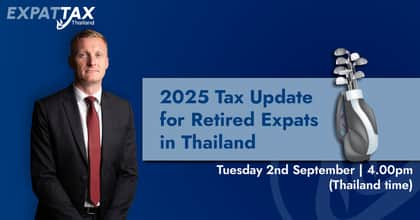Need help?
Thailand has become one of the most popular destinations for German expats, whether for retirement, long-term living or remote work. The country offers an affordable lifestyle, warm climate and a welcoming community, attracting thousands of Germans each year. In fact, according to the Statistisches Bundesamt, there are around 30,000 Germans residing permanently in Thailand, with around 7,000 to 8,000 of them living in Pattaya alone.
One of the responsibilities of living in Thailand is understanding how Thai and German tax rules interact. Many expats assume that once they spend most of their time here, their ties to Germany end. Some rely on the so-called ‘183-day rule’ and believe they have no obligations anywhere. The reality, however, is far more complex.
The Thai–German Double Taxation Agreement (DTA) plays a central role in deciding how different types of income are taxed. It is designed to prevent you from being taxed twice on the same income, but it does not let you bypass filing requirements. Both Thai and German authorities now exchange financial information, so understanding the rules is essential to staying compliant.
This guide explains how German pensions, property income, dividends and capital gains are treated in Thailand, how the DTA works to protect you, and the steps you need to take to avoid unnecessary complications.
Who This Guide Is For
This guide is written for German nationals who are living in Thailand or considering a move here. It will be especially useful if you fall into one of these groups:
- German citizens living full or part-time in Thailand
- Retirees receiving pensions from Germany
- Expats with German rental property, dividends or investments
- Self-employed Germans working remotely from Thailand
If any of these situations apply to you, the information in this guide will help you understand how Thai and German tax rules interact and what steps you need to take to remain compliant.
Common Myths About German Tax Residency
German expats are often unsure how residency rules work, which can make tax obligations more complicated than expected.
Here are three of the most common myths:
Myth 1: ‘The 183-day rule means I’m safe.’
The 183-day rule is only one part of the picture. Even if you spend fewer than 183 days in Germany, you may still have unlimited tax liability if you maintain a residence or domicile there.
Myth 2: ‘I don’t live in Germany, so I can’t be tax liable.’
Not true. If you keep a home in Germany that you can return to at any time, the tax office may treat this as a permanent residence. That alone can trigger unlimited tax liability, even if you spend most of your time abroad.
Myth 3: ‘Having a holiday home in Germany doesn’t count.’
Owning a holiday home or apartment in Germany can also create tax obligations if it is available for your use. What matters is whether you have a place to return to — not how often you actually stay there.
Unrestricted vs. restricted tax liability
- Unrestricted tax liability means you are taxed in Germany on your worldwide income. This usually applies if you have a residence or permanent home in Germany.
- Restricted tax liability applies when you no longer have a residence in Germany but still have German-source income such as rental property, pensions or dividends. In this case, you are only taxed on that German income.
How the Thai–German DTA Works
Thailand and Germany signed a Double Taxation Agreement (DTA) in 1969. The agreement sets out clear rules for which country has the right to tax different types of income, and it contains 30 Articles covering everything from employment income to pensions and property.
The DTA takes precedence over domestic law. This means that if the treaty gives taxing rights to one country, that provision overrides the national rules of the other.
In practice, the DTA decides which country taxes which income type:
- Pensions – civil service pensions are taxed only in Germany, while most other pensions can be taxed in Thailand if remitted.
- Rental income – property located in Germany is always taxed in Germany.
- Dividends – subject to German withholding tax, but when remitted to Thailand, they must also be declared there, with tax credits usually available.
The goal of the DTA is to stop you from being taxed twice on the same income. However, it does not remove the need to file a return in Thailand if you are a tax resident.
Thai Tax Rules for German Expats
German nationals in Thailand are subject to the same tax rules as other expats.
The key points to understand are:
- Tax residency – if you spend 180 days or more in Thailand in a calendar year, you are a Thai tax resident. Your visa type does not matter.
- Assessable remitted income – salary, pensions, dividends, rental income, investment gains and other foreign income are taxable in Thailand once they are remitted, transferred, withdrawn or spent here.
- Domestic income – any Thai-source income, such as local salary or rental property, is always taxable regardless of how long you stay.
- Filing deadlines – the Thai tax year runs from 1 January to 31 December. Annual returns (PND.90 or PND.91) must be filed by 31 March of the following year, with a short extension to early April for online filing. A mid-year return is due by the end of September for certain income, such as Thai rental property.
For German expats, this means that both overseas income remitted to Thailand and any domestic income must be declared once you qualify as a tax resident.
Tax Compliance and Enforcement in Thailand
Tax enforcement in Thailand has become much stricter in recent years, and German expats should be aware of how closely financial activity is now monitored.
How compliance is tracked
- AI and bank reporting – Thai banks now share data with the Revenue Department, and artificial intelligence tools are used to identify patterns such as ATM withdrawals and overseas card use.
- CRS and FATCA – Germany and over 120 other countries automatically share financial account information with Thailand under the Common Reporting Standard. This means that Thai authorities can view details of German bank accounts, investments, and pensions.
- Immigration records – your days in Thailand are automatically logged through the arrival card system, making it easy for the Revenue Department to check whether you meet the 180-day rule.
Penalties for non-compliance
- Fines and surcharges of up to 200% of the unpaid tax
- Back tax assessments going five years (or ten in cases of fraud)
- Potential impact on your Thai visa status
- In severe cases, criminal liability
For German expats, the message is clear: if you are a Thai tax resident and remit income, you must file a return.
How Different Types of German Income Are Taxed
The Thai–German Double Taxation Agreement sets out which country has the right to tax different income types. For German expats in Thailand, the treatment depends on both the source of the income and whether it is remitted.
Employment income
Tax is due where the work is physically carried out. If you are employed in Germany, your salary will usually remain taxable there. If you work remotely from Thailand, that income can become taxable in Thailand once remitted.
Pensions
- Civil service pensions are always taxed in Germany and are exempt from Thai tax under the DTA.
- Other pensions (state, company or private) are taxable in Thailand if you are a tax resident and remit the funds. Any tax already paid in Germany may be used as a credit.
Read our comprehensive guidance on tax on overseas pensions.
Rental property income
Property is always taxed in the country where it is located. German rental income is therefore taxed in Germany and excluded from Thai tax, even if the proceeds are remitted.
Navigating Taxes on Property Sales and Rental Income in Thailand
Dividends
Dividends from German companies are subject to withholding tax in Germany (generally 25%, reduced to 20% under the DTA). If you remit these dividends into Thailand, you must declare them there, but you can usually offset the German tax paid as a credit.
Interest
Interest from German banks or loans is also subject to withholding tax in Germany. Under the DTA, the rate is reduced to 10%, creating opportunities for planning. For example, in some cases, it may be more efficient to take income as interest rather than dividends.
Capital gains
If you sell investments such as shares or ETFs and remit the proceeds into Thailand, the gains are taxable in Thailand as assessable remitted income. The taxable amount is based on the gain made since acquiring the asset, not since moving to Thailand.
Capital Gains Tax: A Guide for Expats in Thailand
Allowances and Tax Rates in Thailand
Once you are classed as a Thai tax resident and remit assessable income, you can claim standard allowances and must pay tax at progressive rates.
Key Allowances
- Personal allowance of 60,000 baht
- Spouse allowance of 60,000 baht if your spouse has no income
- Child allowances for dependent children
- Health insurance premiums up to 25,000 baht (if from a Thai policy)
- Life insurance premiums up to 100,000 baht, including health cover
- Age allowance of 190,000 baht if you are 65 or older
- Salary deduction of up to 100,000 baht (if you remit employment income)
Progressive tax rates in Thailand
For German expats, this means that even if you remit only part of your overseas income, you must declare it, apply allowances and then pay tax on the remaining balance at these rates.
More details on tax rates, allowances and deductions.
Practical Tips for German Expats
Managing your taxes as a German expat in Thailand can feel daunting, but a few simple steps make it much easier to stay compliant and avoid problems later.
- Track your days in Thailand
Your Thai tax residency depends on spending 180 days or more in the country. Keep a clear record of your travel to avoid mistakes. - Keep evidence of pre-2024 savings
Money you had in the bank before 1 January 2024 is not taxable when remitted, but you must be able to prove it. Use bank statements and apply the first-in, first-out rule to show what balance remains. - Separate your income streams
If possible, keep pensions, dividends, rental income and investments in different accounts. This makes it easier to show where money came from and how it should be taxed. - Document gifts and inheritances
If you receive non-taxable funds such as family gifts or inheritances, keep notarised deeds or formal documentation. Thai authorities may ask you to prove the source. - Plan your remittances
Because Thailand only taxes income in the year it is remitted, you can decide when and how much to bring into the country. This can help manage your tax liability across different years. - Use DTAs wisely
If tax has already been paid in Germany, you may be able to claim a credit in Thailand. Keep all relevant certificates and documentation to support your claim.
Watch Our Webinar: Germany-Thailand DTA Explained

Frequently Asked Questions from German Expats
German DTA
Yes, unless it is a civil service pension. Civil service pensions are only taxable in Germany. All other pensions must be declared in Thailand if remitted, but you may be able to use the German tax already paid as a credit.
No. Rental income is always taxed in the country where the property is located. German rental income is therefore taxed in Germany, even if you transfer the money to Thailand.
Savings held before 1 January 2024 are not taxable when remitted. You must keep bank statements and use the first-in, first-out method to prove the source of funds.
No. Remittance occurs as soon as money enters a Thai bank account, regardless of whether it is in euros, US dollars or Thai baht.
Yes, if you want to prove your Thai tax residency to German authorities. It must be obtained from your local Thai tax office and usually requires filing a return first.
If the German tax office has formally deregistered you, you can usually rely on this. However, keep documentation of the decision in writing to avoid future issues.
Dividends are subject to German withholding tax (normally reduced to 20% under the DTA). Interest enjoys a lower withholding rate of 10%. Both must be declared in Thailand if remitted, but tax credits may apply.
If you sell investments and remit the proceeds to Thailand, the gains are taxable here as assessable remitted income. The taxable amount is the gain made since you acquired the asset.
Our team can support you with:
- Obtaining a Thai Tax Identification Number (TIN)
- Filing annual and mid-year returns securely through our online portal
- Guidance on how the Thai–German DTA applies to your situation
- Back tax filing if you have missed returns in previous years
- Free consultations to answer your questions
Whatever your circumstances, we are here to make the process clear and stress-free. The best way to get started is to speak directly with our support team. They will listen to your situation, explain how the rules apply to you and give you practical next steps.


